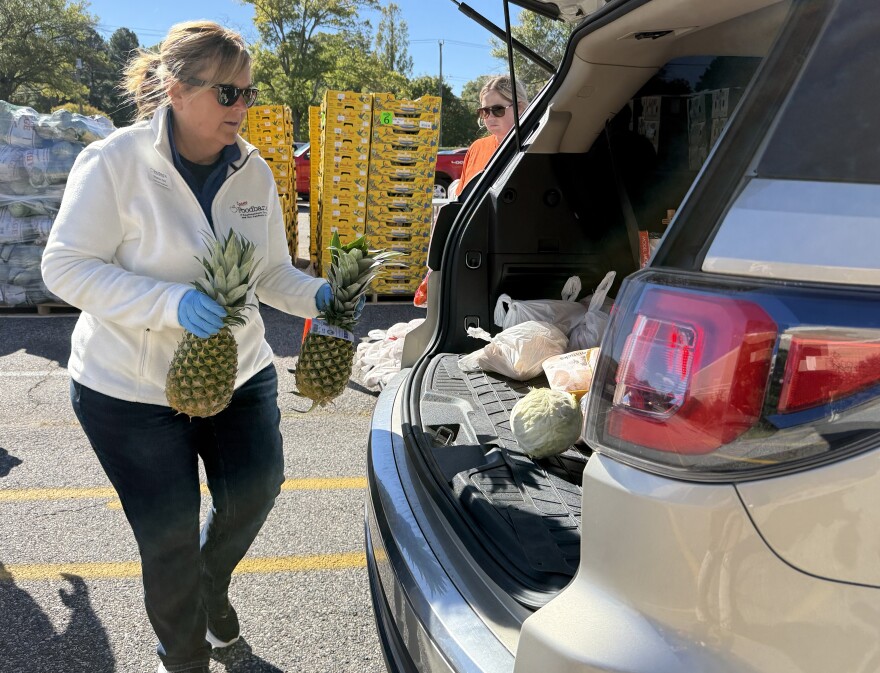Morley Proctor, the spouse of a sailor, joined dozens of other military family members on a recent afternoon at the food pantry inside the Armed Services YMCA in Virginia Beach.
"I've got a few little breakfast items and a couple of canned goods and some rice and little pastas and stuff to help fill the gap of what I don't have in the house right now," Proctor said.
The couple recently moved from Tennessee, and their budget is tight. Her husband received a paycheck Oct. 15, but that doesn't remove the anxiety the couple has experienced since the federal budget shutdown began. She said she’s started making deliveries for DoorDash.
"What I'm having to do is get out and supplement to make sure that we've got food and make sure that we have everything that we need, and wondering how we're getting our bills paid," she said.
The Armed Services YMCA food pantry is one of several in the region around Norfolk and Virginia Beach, which is home to around 80,000 military personnel and some 60,000 other federal workers.
Demand at food distribution events has been high since the shutdown began. Some days, the YMCA pantry has to close early because it runs out of food. At an Oct. 17 event sponsored by the Foodbank of Southeastern Virginia and the Eastern Shore, people started lining up at 4:30 a.m., more than six hours before the gates were scheduled to open.
Food insecurity has long been an issue in the military, especially for young families, but this month has seen a 30 percent increase in nationwide demand at the Armed Services YMCA, which operates 22 food banks near installations around the country.
"In Texas, there was a lady who was a week and a half away from giving birth who had to wait in line for an hour and a half," said Dorene Ocamb, the chief brand development officer for the national organization. "She was understandably concerned that she wasn't going to have the food that she needed after she had her baby."
The Trump Administration allowed the Pentagon to move funds in order to make the Oct. 15 payroll for the roughly 1.3 million active duty troops, as well as National Guard and Reserve personnel on active duty.
But most federal civilian employees were not paid, which affects many military families. During the Biden Administration, service members' spouses were encouraged to work for the government, including at local bases.
It was part of an effort to bring down unemployment for military spouses, who have a difficult time finding jobs because families move so often. Those civilian workers haven’t been paid since the shutdown began.
At the Navy Marine Corps Relief Society, which provides aid to military families in times of need, clients are concerned not only about putting food on the table, but also about the possibility of being evicted or having their cars repossessed, said Dawn Cutler, executive vice president and chief operations officer.
"Those kinds of things are very real for our service members," Cutler said.

The organization is encouraging troops to cut back, in case future paychecks don’t arrive on time - and to stay away from high interest pay-day loans.
And though the Oct. 15 paychecks came through, Cutler noted that many sailors and Marines have direct deposit arrangements that allow them to withdraw money as early as the Friday before their paycheck arrives.
With the uncertainty surrounding the shutdown, some banks and credit unions didn’t allow those early withdrawals. The Relief Society processed $317,000 in emergency bridge loans to 255 clients just in the week leading up to October 15, which was a huge spike for the organization, Cutler said.
Another complicating factor: the shutdown came just after the bulk of PCS season - or Permanent Change of Station. That's when more than 400,000 military families move around the country or around the globe.
The non-profit Blue Star Families organization estimates families spend on average an extra $8,000 on moving expenses not picked up by the government.
"It is a critical time for military families," said Daniela Hines, a Navy spouse who works for Blue Star Families in Norfolk.
"The younger generation of military families have less than $3,000 in savings. That comprises one-third of military families," Hines said. "All of this financial instability is really impactful for them and causes a lot of angst."
This story was produced by the American Homefront Project, a public media collaboration that reports on American military life and veterans.





